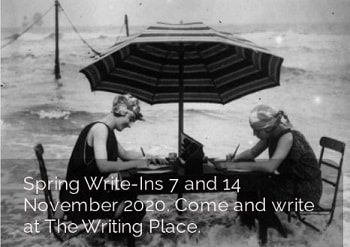 Let's say you want to write about your life. Maybe you've traveled to exotic places and had jungle encounters with wild animals ... perhaps you set yourself a personal challenge to swim across Cook's Strait, and on the day it was blowing a gale but you did it anyway, by golly. Did you experience a time of grief and sadness, as a result of a loss, or endure a health crisis that necessitated stays in hospital, lengthy treatment, and a long recovery that changed every aspect of your life? Does your family have a fascinating history, grandparents who fought in world wars, kept diaries as they sailed to New Zealand as immigrants way back when, to forge a new life in what was a wild and untamed place, far from home and all that was familiar? We all have stories to tell, whether they are are own, or we're breathing life into those of our parents or ancestors. Sometimes it's hard to know where to start. There is so much material, an overwhelming multitude of thoughts and memories, like a giant scrapbook with pages all over the show and pictures falling out everywhere, no rhyme or reason to any of it. It's such an avalanche of material, we're lost in it. What to do? Come to a Write-In. I say this because talking about it helps to clarify, distill, break all of that BIG IDEA into manageable pieces. Working in isolation is fine when you've made a start and have a path to follow but when you're struggling with the 'where to start' thing, it can be really helpful to talk to other writers who 'get it' and understand how hard this part of the process can be. I've written before about a writers' group I attended for many years. We've gone our separate ways now but I was so grateful for that supportive presence of other writers, never more so than when I was trying to get started on something. There's a trust that develops amongst a small group, even one that is meeting for the first time, and it doesn't take long for that camaraderie to emerge. That's one of the best things about a Write-In. People arrive, unknown to each other, and leave as colleagues, all sharing that wonderful ability to weave words into gold. And the best part? Coming away with a direction for that story or project, knowing how and where to begin, with energy and enthusiasm, inspiration and motivation. Join us for a Write-In, Saturday 7th or 14th November, or both. I guarantee you'll enjoy it, or I'll eat my Halloween witch's hat.
0 Comments
 I'm having a Spring write-in, two in fact, the first on Saturday 7 November and the second a week later on the 14th. Find out more! Sorry to say, it's not a love-in (popular back in the 60s with the hippies, an outdoor public gathering and demonstration of love, friendship and unity, often with psychedelic drugs) however it is a chance to get together with other writers, do some writing and share experiences of the writing life. The write-ins are held at my Writing Place here in Arkles Bay, a beautiful bay that a friend of mine recently referred to as 'the jewel in the crown of Whangaparaoa' - and it is indeed a lovely, peaceful place to live and write. I'm not the only writer living in Arkles Bay. There's another writer a few doors down from me, and a few more residing nearby. So what is a write-in at The Writing Place? It's an informal gathering of up to six writers, here at my writing studio, from 10am to around 2pm. First up is coffee or tea and a chat where we introduce ourselves, talk about our writing preferences (and these vary considerably, from genres like fantasy and horror, to children's fiction, memoir, life story and more) and what we'd like to do with the write-in time. Some writers have projects they're working on and just need some quiet hours. Others come to receive guidance and support to make a start. Some attend just to be with other writers and this alone can be a reassuring and confidence-boosting benefit. We usually begin the day's work with some timed writing exercises. I give writers 3 minutes to write on a set topic, or I'll offer up a beginning like, 'Today I feel like ...' and they do the rest. This is a good way to begin as it warms up those writing muscles. All are welcome to read their short writings to the group if they'd like to, and then we're into our work for the day. During this time I offer a 15 minute individual coaching/mentoring session to each writer. They may have a particular problem they wish to chat about and this could be anything from writing process to getting published or overcoming a roadblock. We break for lunch (everyone brings their own and we sit out on the deck with a view of the bay, if the weather is nice) and chat and then we do some more work. Towards the end of the day we'll have another sharing time of readings and feedback. Now, I have to stress to you that the sharing is entirely optional. There is no pressure whatsoever to share work with the others but comments from previous write-ins have indicated that writers feel very comfortable here, confident and safe in this environment and that is great to hear. So won't you join us for a day of writing on either the 7th or the 14th, or both? It's just $35 to come to the write-in and I can guarantee you'll leave feeling relaxed, confident about your writing, and you'll have made some new friends. You may even have made a start on a novel or project, or have come up with something you never thought possible ... good on you!  Let's say each word you write costs you a dollar. Your natural response would most likely be, 'I want to save money.' Inflation might bring this up to $5 in a few years' time. Then you'd be very economical. Now I know that when we're in the heat of creation on that first draft, we're encouraged to get it all out on the page - blah on without restrictions - so we're going to spend a lot of money on those words. And I think that's OK because, if I can get lyrical here, our creativity is richly endowed and can afford it. But when it comes to editing back, honing our story to perfection, each word matters and has to earn that dollar or five dollars to deserve its place in your story. And if you remember that each word is costing you, you will be ambitious about cutting out the ones that don't serve the purpose so you can save 'money'. Let's take an example: here's something I wrote recently as part of the book I'm writing about my Mom. It's definitely first draft stuff. Here goes: Whenever we went to the beach, Mom would always wear her palm frond hat she got in Fiji when we came over on the boat from America. Over time, it got faded and crisp, those fronds were sticking out all over the place and the little bird that used to nestle on the side was long gone, blown away one day with the tidal winds. She also wore a bathing suit with a funny skirt that used to float about her as she waded into the water and along with the hat she looked like some kind of exotic bird. That's 100 words and at, say, one dollar a word, that passage has cost me $100. Way too dear. So now I take to this passage with a financier's eye and cut back to what I can afford, and what my story actually needs to move it along: Mom had a faded palm frond hat she wore to the beach and a bathing suit with a skirt that floated about her like some exotic bird's plumage as she waded into the water. 33 words, $33 dollars, and I've saved $67. The sentence isn't quite to final draft stage but you see what I mean. Does the reader really need to know that the hat came from Fiji, bought while we were on a boat? This information, in fact, is covered earlier in the story, and we don't need to know about the bird that once decorated the hat. What is important is the hat and the bathing suit and the image of Mom as some kind of weird bird. Words can cost us dearly, not in monetary terms, but because too many of them can hold up action. We have to be ruthless when we're editing. Think economy, saving money, working to a budget, making every dollar count. Every word need to be there for a reason. Every word is there to serve the story and move it along because the story is everything. |
Archives
January 2024
|